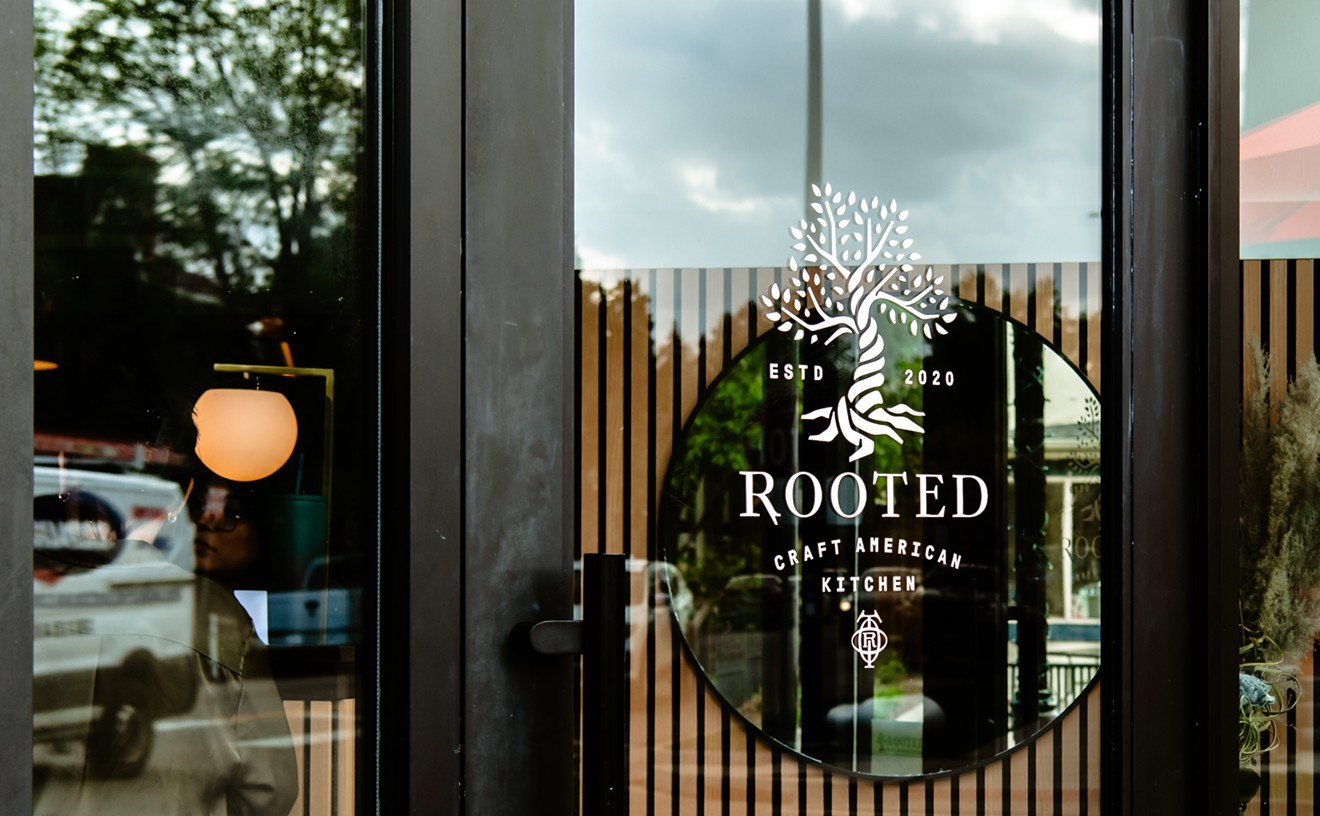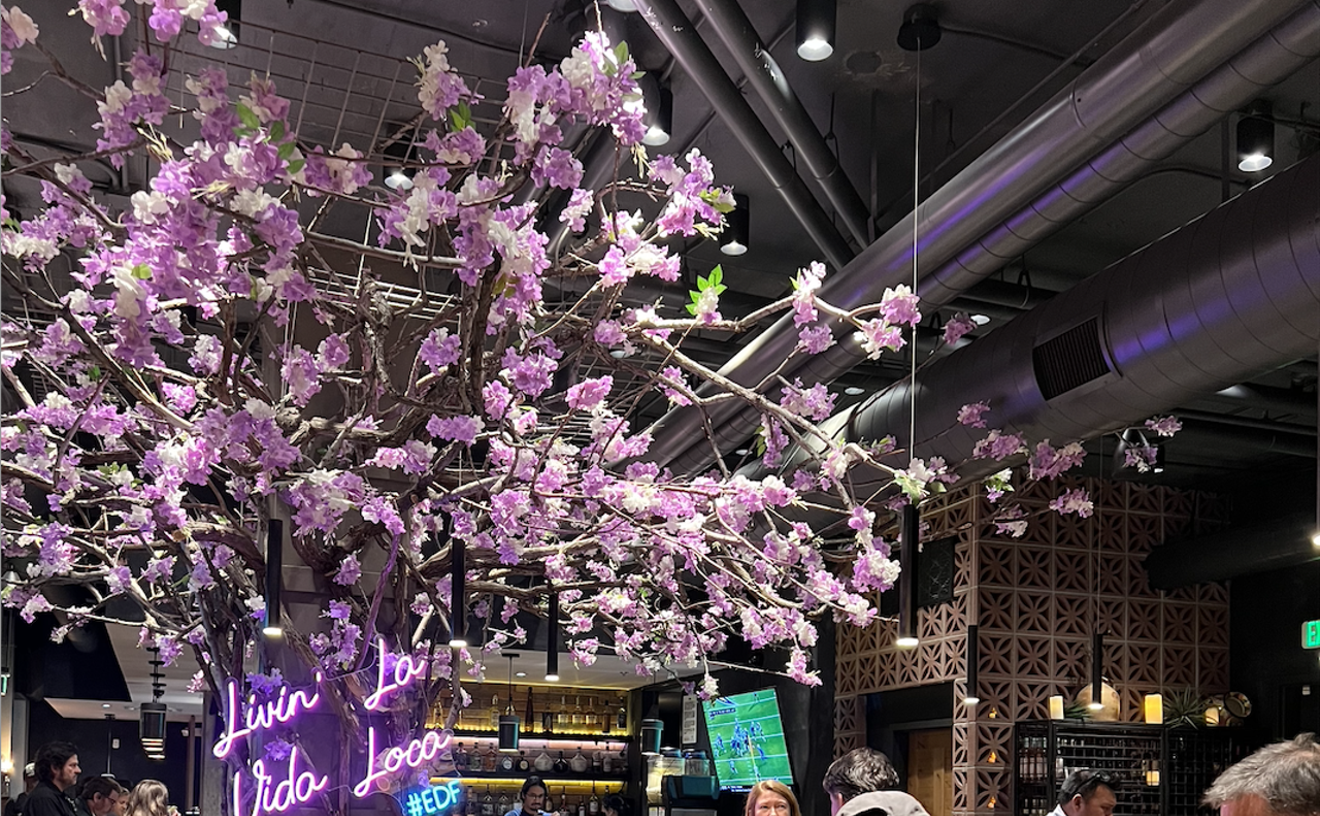The Palace Arms specializes in excess. Not just plain excess. Not cheap, tawdry, modern excess, but classy, well-aged and dignified excess. The kind of excess that almost demands you don an ascot and monocle before partaking in it. I love the very possibility of dropping three grand on a dinner and knowing that were I to do so, I would not have a quibble when the final bill arrived. Knowing that such an option exists in Denver cheers me to no end. I love the fantasy.
Because I'm not a guy who's going to drop that three grand. I'm not going to be choosing from the rare-vintage pages of the formidable wine bible or ordering the beluga caviar and traditional garniture -- and neither is anyone I know. Neither is anyone I've ever likely met. I know a lot of people with some money at their disposal. I know some people with a lot of money at their disposal. But I don't know anyone who's going to step into the cloistered estate of the most formidable restaurant in Denver and unload the price of a used Camry on dinner and drinks.
And admitting this just makes the fantasy of the Palace Arms even sweeter. As a blue-collar kid, a Rust Belt punk raised by working-class parents who never let me know when we were broke, this is not my native habitat, not my biological niche. And yet there's nothing to prevent me from coming here. There is no credit check at the door, no top-hat-and-tails requirement (in fact, even the long-standing jacket rule has been ditched), no sign that reads YOU MUST BE THIS RICH TO RIDE THIS RIDE. I may not be able to eat the caviar or drink the forty-year-old tawny port, but I know it's here. I know it'll always be here, waiting, cellared like a promise, a goad reminding me that someday it might be nice to get obscenely fucking rich.
Right now, though, it's enough that someone like me can have a favorite table at the Palace Arms: in the corner by the maître d' stand, between the two display boxes holding the stiletto and matched dueling pistols once owned by Napoleon and his wife. I like a place that keeps firearms around just in case some matter of honor should need to be settled in the dining room. Such behavior wouldn't be entirely foreign inside the walls of the Brown Palace, either. A duel over the proper temperature at which a consommé ought to be served? Those would not be the first shots fired here.
The Brown has been around since 1892, and the hotel's highest-end restaurant since 1950 (when it opened with a head waiter who'd flown with the Red Baron). The Palace Arms is elegant in a way that isn't considered elegant anymore, only old and tired. Yet there's energy here, a vitality fueled by reputation, offering sophistication without arrogance, history without (too much) stodginess, excellence without compromise or thought of cost. The dining room is decorated in early snobbish: cloth wallpaper and art glass; rich red-leather upholstery and reproduction revolutionary flags. On the floor, the waiters are in tuxedos. They move silently, never hovering, and their timing is immaculate.
My holiday meal was a treat to myself, an early gift as I headed into the long stretch of the season, taken alone and at my favorite table. It began with water -- artesian, taken from the hotel's own well -- and a glass of cold sancerre served in appropriate stemware. Bread, a choice of brioche, sourdough or a boule of some description, came on a silver salver, transferred from tray to side plate by a man trained in the esoteric serving art of using two heavy forks like chopsticks -- a French trick that I've always found slightly ridiculous. Here it was charming, even if he fumbled a bit trying to cut a pat of butter. The bread was warm, the butter soft, the wine ice-cold. Dinner was starting off quite nicely.
"An amuse from the kitchen," my waiter said, appearing at my shoulder like a ninja. I expected to see a puff of smoke where he'd materialized. On my liner plate bearing the Brown's crest, he set a tall, thin cordial glass of something red topped by something gray that smelled faintly of meat.
Seeing my puzzlement, he helpfully explained, "Cranberry cider topped with a foie gras foam. Please enjoy."
My first thought: That is going to be impossible.
My second thought, after I'd raised the glass to my lips and shot its contents like cheap whiskey: Sweet Jesus, I'm going to choke.
The amuse wasn't just disagreeable, it was foul. It was a cranberry-and-liver smoothie and tasted exactly as nasty as it sounds -- although it was flawlessly executed. The fatty foam was light and aerated, floating delicately atop the bittersweet and dark-red cranberry cider, sharply separated and unmingled like a good pastis. It was pretty to look at, but vile in both concept and flavor. It was also free, and I trusted that things would get better once money was involved.
Lots of money. I asked the waiter for the market prices on the caviar -- a couple hundred dollars an ounce for sevruga and osetra, five hundred-some for the outlawed beluga -- and I wanted very badly for that little tin to be opened at my table, for that smell of salt and brine and borax to tint my breath. Men die over beluga caviar. For many years, much of the trade was controlled by the Russian mafia. I've often thought that smuggling would be an exciting way to pass a few years. Nothing so tawdry as drugs or guns -- I would bring in saffron from Grenada, volcanic salts from the South Pacific, caviar. If you know the right people, the right places, food can be worth more than gold or cocaine. Plus, you're dealing with a different class of customer. Become a dealer in sturgeon eggs, and suddenly I would belong in rooms like this one. But not yet. So I passed on the fish eggs and went instead for the short rib of Kurobuta pork. "Like a Kobe beef cow," my waiter explained, "only it's a pig."
And he was right. Imagine a pig made entirely of soft, silky-smooth pork belly and fat. That's a Kurobuta. Braised in star anise, lacquered with ginger and set in a swirled puddle of truffle vinaigrette, this short rib was the best I've ever tasted. Sweet and salty, tender as a marshmallow, seeming to melt against the warmth of my tongue, it was a singular experience. From across the room, my waiter smiled when he saw my eyes flutter closed: another convert. If not for fear of mussing my suit, I would've lifted up the plate and licked it.
Next, the Ruby Red prawn consommé, as clear as flawless amber, eaten, literally, with a silver spoon. A good consommé is amazing, with depths of flavor seemingly coaxed out of thin air; done wrong, it tastes like dirty water. And this consommé was stellar, complex and comforting at the same time, muscled up just slightly by a tangle of softened black trumpet mushrooms mounded up in the center of the bowl, three tiny wisps of sliced prawn, a couple disks of sunchoke and six fava beans. I wanted to swim in it.
The consommé was followed by a pause in service, a pour of spicy Argentine malbec in a bulbous, wide-mouthed glass, a moment stretched long -- just enough for me to grow hungry again. And then came the Rossini of King Canyon bison, a steamship classic given a Colorado makeover by chef de cuisine Thanawat Bates and his crew. I don't know another chef working who wouldn't be embarrassed to put a Rossini on his board; it would be like serving beef Wellington, like opening with stuffed mushroom caps. Yet Bates's unabashed menu also included loup de mer, duck l'orange and potato mousseline, and if there's a place anywhere that could resurrect and give new life to such culinary fossils, this room is it.
Using filet of bison rather than beef was a smart twist, but mostly it was the rigorous replication and perfect presentation of all the ancillary elements -- the things that make a Rossini a Rossini -- that elevated this plate to excellence. The slip of foie gras mounted atop the erect filet was pan-seared and buttery, nearly melting down the edges of the meat tower like something out of Dalí. The hollandaise was fresh, murderously rich, and speckled with slivers of powerful black truffle. The bison sat on a base of sautéed Swiss chard and a disc of stiff, toasted brioche, and the center of the plate was napped with an amazing Madeira sauce so glossy and thick and rich, it must've been mounted with blood, marrow or foie gras butter. Nothing else would have given it this gloss; nothing else would have coagulated so smoothly as it cooled. The Rossini was lovely and imposing, and so delicious that it made me wonder why such beatific preparations vanished from the menus of serious restaurants in the first place, banished to wedding buffets and supper clubs and the odd hotel restaurant.
Around me, flames leaping from the bananas Foster prepared tableside lit up the dining room. I skipped dessert in favor of a pot of coffee, knowing both that I was so full I would waddle when I left and that a meal at the Palace Arms always ends with macaroons: three of them, delivered on a doilied silver tray. Rich with almonds, tasting of honey, textured like crisp taffy -- I don't know what deal with the devil the pastry chef cut, but it was totally worth it. Showing remarkable restraint, I ate only one and slipped the other two into my jacket pocket. It would probably be some time before I made it back to the Palace Arms; I told myself I wanted to take a little of the fantasy with me.
And then I ate both macaroons before I even made it to the car. I'd denied myself the beluga, the century-old cognac. But don't ask someone like me not to eat the free cookies.










